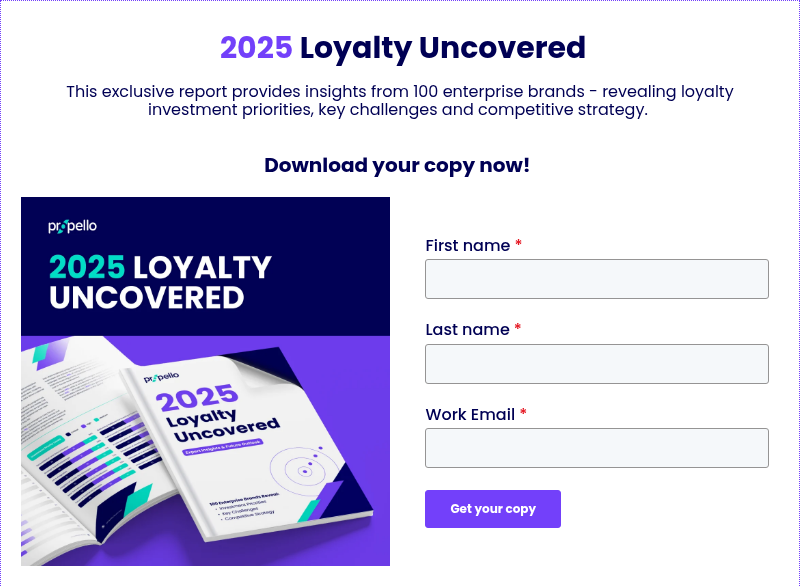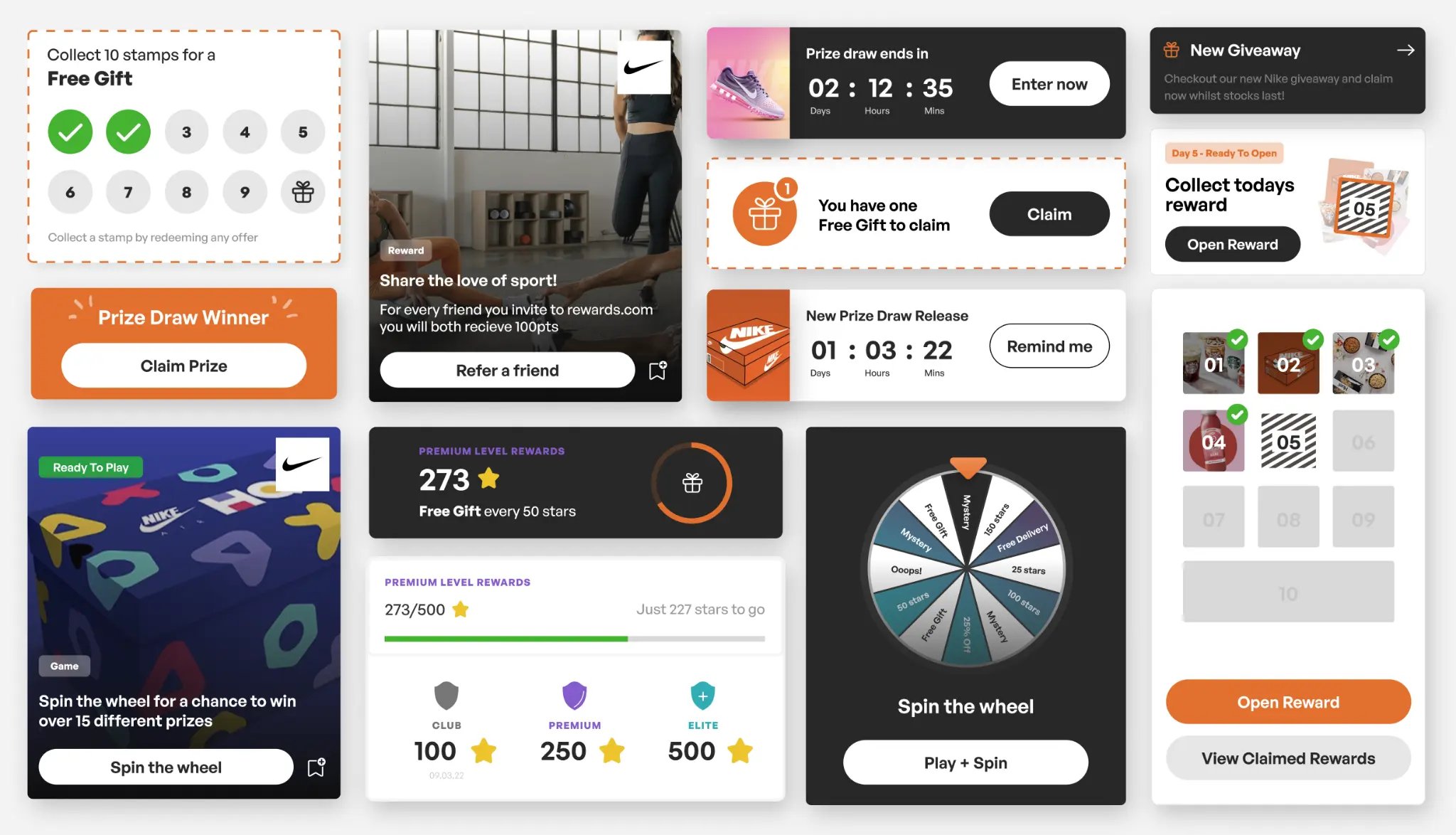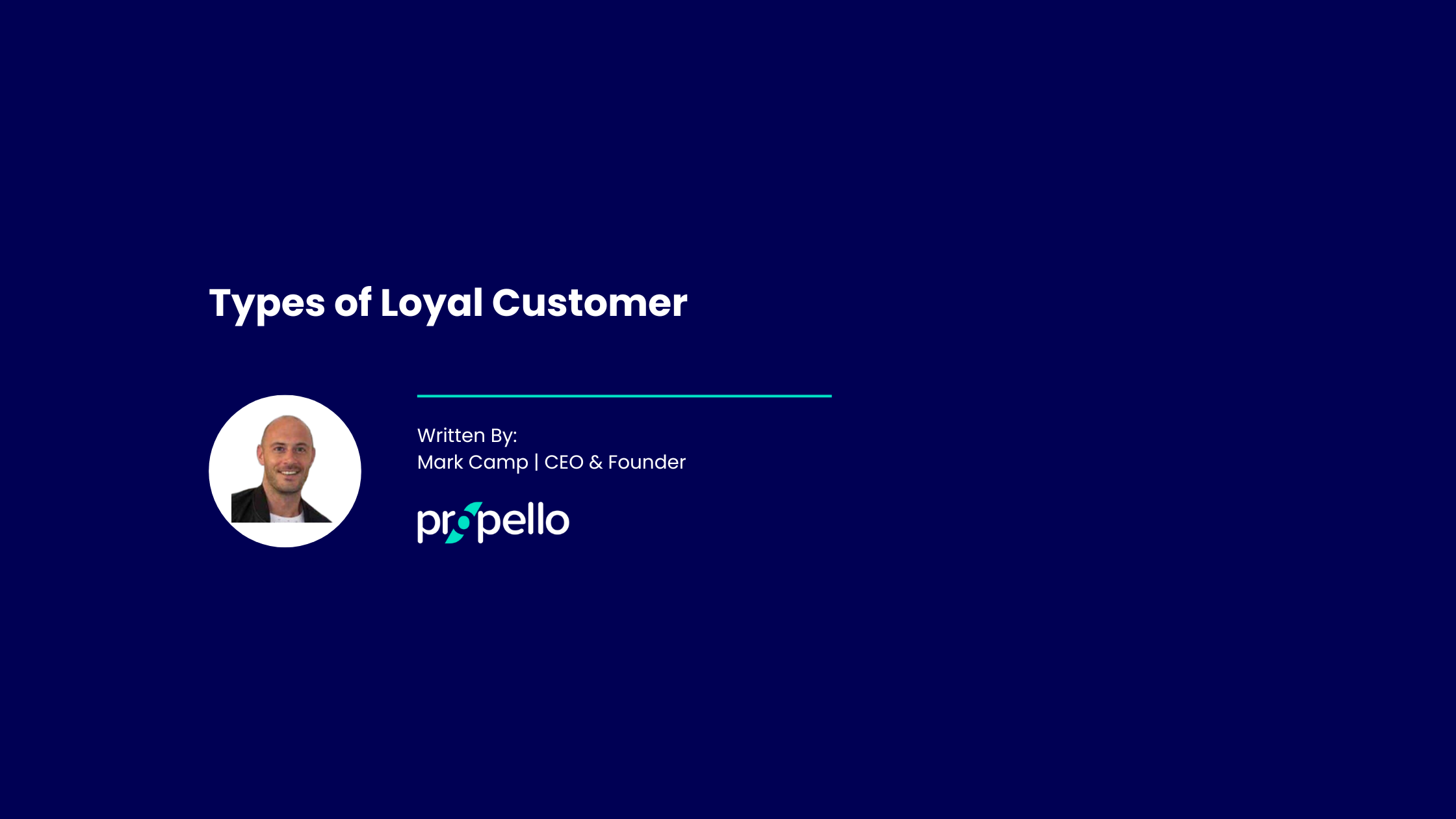Discover the six different types of loyalty and how they impact your business. Learn strategies to foster emotional, advocacy, transactional, social, engagement, and behavioural loyalty. Understand how a well-designed loyalty programme can help you retain customers, increase revenue, and gain a competitive edge.
Customer loyalty is a cornerstone of successful businesses, but it's a complex concept that goes beyond simple repeat purchases. To truly understand how to foster and maintain customer loyalty, it's essential to recognise the different forms it can take.
In this article, we discuss the different types of loyalty:
-
Emotional Loyalty, rooted in personal connection
-
Advocacy Loyalty, marked by enthusiastic endorsement
-
Transactional Loyalty, based on repeated purchases
-
Social Loyalty, influenced by social circles
-
Engagement Loyalty, driven by active involvement
-
Behavioural Loyalty, reflected in consistent actions.
Each type offers valuable insights into the intricate dynamics of customer-brand relationships and reveals strategies for building lasting connections with your audience.
Contents:

Key Takeaways
-
Understanding the different types of loyalty allows you to create targeted strategies that resonate with your target audience at various stages of the customer journey.
-
Emotional loyalty is rooted in personal connections and thrives on providing exceptional customer service, engaging meaningfully with your target audience, and building trust.
-
Advocacy loyalty works through customers who enthusiastically endorse your brand, attracting new customers through word-of-mouth referrals and improving your bottom line.
-
Transactional loyalty, based on repeated purchases, can be encouraged through loyalty programmes that offer access to new products, discounts, and rewards based on customer spends.
-
Cultivate social loyalty by rewarding customers to share their experiences and recommend your brand to others in real time.
-
Engagement loyalty is driven by active customer involvement and can be enhanced by monitoring customer interactions and providing relevant, targeted content to your customer base.
-
Behavioural loyalty is reflected in consistent actions and can be analysed using data science and machine learning to gain insights into the factors driving customer purchases and retention.
What are the Different Types of Customer Loyalty?
1) Emotional Loyalty
This type of loyalty relies on building a deep, personal connection with the customer. When a customer's feelings of recognition and importance are consistently reinforced through their interactions with a brand, an emotional bond is formed.
Transactional rewards form the backbone of many loyalty programmes. This is a great strategy for retaining customers, but to solidify the relationship, you need to connect with them on an emotional level.
The act of being loyal is more an expression of emotion than a simple transaction or a series of repeat purchases. Emotionally loyal customers are less likely to be influenced by competitor products, even if they offer cheaper prices.
"Emotionally loyal customers will continue to patronise a brand even when presented with viable alternatives, and studies have shown that customers who have formed strong emotional connections are 32% more likely to make repeat purchases and spend 46% more often."
The end goal of fostering emotional loyalty is to win their trust. Customers are much more likely to trust a business when they perceive they are being treated with dignity. They will also have more faith in a business if they see consistent authenticity across all channels and interactions.
How can you put this into action? Simply focus on what makes your brand unique (its values) and make sure you’re offering something of real value. Beyond that, you could also empower your customer service team to engage meaningfully with your target demographic.
It’s also important your loyalty programme strikes a balance between transactional and emotional incentives. By doing so, you establish a lasting emotional connection with customers.
What types of loyalty programme drives emotional loyalty?
Now that technology has improved, shoppers always expect to be able to get what they need right away. Providing this instant gratification is a surefire way to strengthen emotional bonds. Always-on reward programmes not tied to spend can make that happen.
In traditional loyalty programmes, customers would have to make repeated purchases to earn rewards. However, they don’t need to gather coupons or points with always-on incentives and rewards.
Instant, personalised rewards back up the excellent service and high-quality products that the customers pay for. This leaves the customer feeling a lasting emotional connection to the business and promotes a feeling of community.
2) Advocacy Loyalty
This type of loyalty involves advocates referring customers to a brand. Advocacy is the best possible endorsement of your products or services. Customers often tell their families and friends about their great experiences interacting with a brand.
71% of customers with a positive social media experience will recommend the brand to others.
What makes this great is that the advocate recommends products or services to people they think will enjoy what you offer—making these people highly qualified leads. Additionally, recommendations from a family member or friend is the highest trusted form of advertisement and it's completely free!
A repeat customer, often called a "brand champion," is more than happy to advocate for your brand. Without shelling out massive sums on marketing, your brand gains a new customer who already trusts your offerings.
Nevertheless, many businesses, both B2B and B2C, don’t use advocacy to its full potential. In part, this is due to the widespread misconception that advocacy should be left to the customers. However, advocacy is something that businesses themselves must plan for. This is yet another excellent reason to launch a loyalty programme.
"Set up a loyalty and referral programme to reward advocates. Brands at the very least should offer bonus points. After all, word-of-mouth is quite the customer acquisition machine. Over 84% of customers trust referrals from friends and family over traditional ads."
What type of loyalty programme drives advocacy loyalty?
Creating a referral programme is a great way to gain loyal customers who will spread the word about your business.
When you offer customers valuable rewards, they will feel more inclined to tell others about their experiences. Incentives can range from price reductions to early access to new offerings. Just giving them the incentive to advocate for your business also significantly reduces customer acquisition costs.
3) Transactional Loyalty
This is the most straightforward form of loyalty. It involves providing discounts and special offers. Discounts are typically offered as part of a customer loyalty programme to drive repeat business.
If implemented properly, transactional loyalty has the potential to yield impressive results and is for that reason essential to successful loyalty programmes.
However, businesses shouldn't rely on transactional loyalty alone. Especially when customers are looking for more innovative ways and incentives for businesses to foster deeper relationships with them via highly personalised offers.
83% of consumers want personalised promotions, but only 44% find the offers they receive relevant. This indicates a significant opportunity to use personalisation strategies to meet customer needs.
Customers might continue to make transactions simply because of convenience without getting any tangible value. The result is that they might leave abruptly for a better deal if the situation changes.
If you put in the time and effort to cultivate the relationship, however, it can pave the way for deep emotional loyalty when used together. Transactional loyalty gets customers interested in your brand, whilst emotional loyalty incentives them to stay loyal for longer.
What type of loyalty programme drives transactional loyalty?
It’s common practice to use an earn-and-burn programme to create transactional loyalty. With their point system, customers are rewarded for their loyalty and use accumulated points to redeem rewards and prizes in the future.
When a customer reaches a certain point total, they are eligible to receive discounts, freebies, and other rewards. It’s important to note that customers are more likely to continue making purchases when they are offered rewards of increasing value.
4) Social Loyalty
When it comes to social loyalty, customers are rewarded for promoting the brand on social media by earning points in a loyalty programme. Sharing on social media may take the form of reposting brand messages or tagging friends and family members on Twitter or Facebook to help spread the word.
Offering incentives, such as discounts or freebies, for writing reviews and rating your product strengthens the bond between your brand and customers.
In addition, it creates a buzz around your offerings as more people view, comment, and share. The main benefit is that it gives businesses yet another tool to maintain their customers' interest.
What type of loyalty programme drives social loyalty?
When looking for a way to increase social loyalty, a referral programme is hard to beat. Offer VIP tokens, exclusive discounts, and freebies to your customers as rewards for spreading the word about your business on social media.
As part of this system, businesses often negotiate compensation with social media influencers in exchange for increased exposure in huge online followings.
5) Engagement Loyalty
This form of loyalty refers to your customers’ engagement with your brand beyond their everyday transactions.
Customers show engagement loyalty by signing up for and interacting with a loyalty and reward programme, subscribing to your newsletter, viewing your YouTube videos, and keeping tabs on your brand. As an added bonus, offer personalised incentives to customers who actively engage with your business outside and between purchases.
To maintain engagement loyalty, you need to keep tabs on how customers are engaging with your brand, what engagement techniques are successful, and which ones need to be shelved. Customer loyalty software can be invaluable for monitoring this kind of engagement and ensuring that it's producing results.
This ensures that your marketing content is relevant to your audience and thus increases the effectiveness of your marketing campaigns.
What the ideal loyalty programme will help you achieve with engagement loyalty is helping your customers climb up the loyalty ladder.
It helps you identify the type of consumer who is likely to be loyal to your brand and target them specifically. It explores the market for the most effective means of interacting with these customers (i.e., gamifying your programme).
It also offers the right mix of advertising and promotions to pique the interest of these potential customers. It heightens their engagement because they know their brand loyalty will be rewarded.
What type of loyalty programme drives engagement loyalty?
Driving engagement can be tricky, which is why businesses use creative and stimulating techniques like gamification to keep customers riveted.
Gamified loyalty programmes allow brands to add an interactive and fun element to their relationship with customers. Brands boost customer engagement with the help of leaderboards, badges, prize draws, and treasure hunts. Participation is simple, and customers will enjoy the friendly rivalry it inspires.

In addition to being essential for customer retention, the heightened sense of community that results from this is another excellent benefit.
6) Behavioural Loyalty
This occurs when a customer repeatedly purchases or makes use of a given brand's goods or services. Although behavioural loyalty is easier to quantify, its underlying causes are not always clear.
Though it's still an important variable to study, the customer's actions don’t always reflect their beliefs. Behavioural loyalty is not sufficient on its own to determine how committed a customer is to a particular brand.
It could simply be certain habits that cause them to return to the same brand. Their reasons could vary from anything in the list below:
-
Positive brand preference (a brand meets important practical and/or emotional needs) also known as attitudinal loyalty or active loyalty.
-
Habitual or apathetic loyalty (to be uninterested in changing brands or retailers because "it's too much trouble" or feeling like they're all similar.
-
Captive loyalty (an unwillingness to switch brands despite receiving little value, usually brought on by cost and availability).
Successful loyalty reward programmes often use behavioural loyalty as a key tool. Algorithms based on data science and machine learning allow us to gain better insight into why customers remain loyal. Analysing this information allows you to tailor your marketing efforts to influence their actions.
What type of loyalty programme drives behavioural loyalty?
Finding the right loyalty programme to drive behavioural loyalty is a difficult task, since the motivations behind customer behaviour (choice) are often elusive. The best approach is monitoring a combination of several loyalty metrics and analysing customer data gathered in the platform or CRM.
Launching an always-on loyalty programme and getting customers to take part in gamified surveys, gathers crucial customer data and simultaneously fosters emotional and engagement loyalty. The better insight you get into factors driving customer behaviour, the better your chances are of influencing that behaviour to secure their loyalty.
Back to top
Leverage the Power of Loyal Customers
Beyond the value and quality of your product or brand, cultivating these different types of loyalty will help you forge lasting relationships with your customers. Your customers are the lifeblood of your company. In the modern saturated market, where a customer has so many options, even the smallest details make or break their loyalty.
Adding that much-needed personal touch to your business is as simple as implementing a loyalty programme. Spend time learning about, connecting with, and empathising with your customers, and you will take your business to new heights.

FAQs
What is emotional loyalty?
Emotional loyalty is a deep connection between a customer and a brand. Brands create emotional connections by building trust, offering exceptional service, and engaging meaningfully with their target audience. It leads to a loyal customer base that continues to support the brand, even when presented with alternatives.
How does advocacy loyalty work?
Advocacy loyalty occurs when satisfied customers actively recommend a brand to others, helping the brand attract new customers through word-of-mouth. These brand advocates share their positive experiences, influencing their social circles and ultimately contributing to the company's bottom line.
What is transactional loyalty?
Transactional loyalty is based on a customer's repeat purchases. This type of loyalty is often incentivised by rewards, discounts, or access to new products. It focuses on encouraging customer spending through a loyalty programme, but it may not necessarily create a deep emotional connection.
What strategies drive social loyalty?
Cultivating social loyalty involves leveraging the influence of your customers' social networks. Strategies include encouraging customers to share their experiences in real-time, offering incentives for referrals, and partnering with influencers to expand the brand's reach and acquire new customers.
What defines engagement loyalty?
Engagement loyalty is a reflection of a customer's active participation and interaction with a brand beyond transactions. It involves consuming content, attending events, and providing feedback. Engaged customers are more likely to become brand advocates, contributing to a loyal customer base.
How is Behavioural Loyalty measured?
Behavioural loyalty is measured by analysing customer actions, such as purchase frequency, average order value, and customer lifetime value. Data science and machine learning help identify patterns and insights into customer-purchased items, enabling targeted strategies to improve customer retention.
Can rewards create lasting loyalty?
Rewards can contribute to loyalty, but they must be meaningful, relevant, and part of a well-designed loyalty programme. While incentives may initially attract customers, building trust and fostering emotional connections are essential for creating lasting loyalty that goes beyond transactional benefits.
What's the role of a loyalty programme in customer retention?
A loyalty programme plays a crucial role in customer retention by offering rewards, personalised experiences, and exclusive benefits. It helps build trust, encourages repeat purchases, and fosters a sense of community among the customer base, ultimately leading to improved customer retention rates.
How can a loyalty programme be customised?
A loyalty programme can be customised by segmenting the target audience based on their preferences, behaviour, and position in the customer journey. Tailoring rewards, communication, and experiences to each segment creates a more personalised approach that resonates with individual customers, enhancing their loyalty.
What are the benefits of loyal customers?
Loyal customers provide numerous benefits, including higher retention rates, increased customer spends, and a willingness to pay premium prices. Happy customers also act as brand advocates, helping acquire new customers through referrals. A loyal customer base gives companies a competitive advantage.
Author Bio, Written By:
Mark Camp | CEO & Founder at PropelloCloud.com | LinkedIn
Mark is the Founder and CEO of Propello Cloud, an innovative SaaS platform for loyalty and customer engagement. With over 20 years of marketing experience, he is passionate about helping brands boost retention and acquisition with scalable loyalty solutions.
Mark is an expert in loyalty and engagement strategy, having worked with major enterprise clients across industries to drive growth through rewards programmes. He leads Propello Cloud's mission to deliver versatile platforms that help organisations attract, engage and retain customers.



.png)